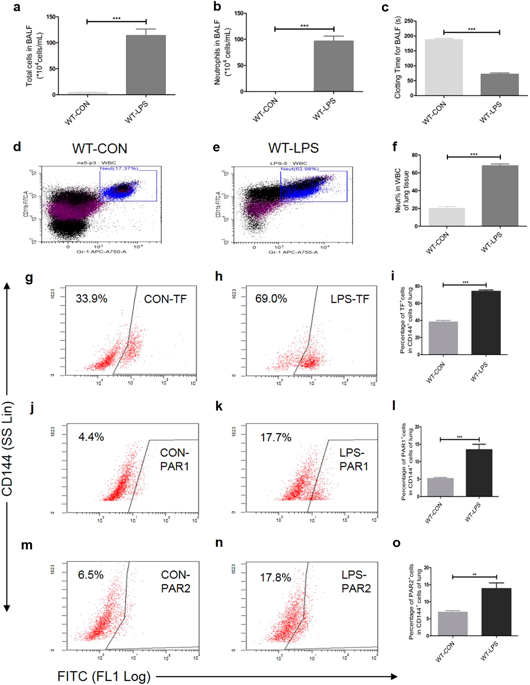当前位置:
X-MOL 学术
›
Acta Pharmacol. Sin.
›
论文详情
Our official English website, www.x-mol.net, welcomes your feedback! (Note: you will need to create a separate account there.)
Endothelial cell-specific anticoagulation reduces inflammation in a mouse model of acute lung injury.
Acta Pharmacologica Sinica ( IF 8.2 ) Pub Date : 2018-11-16 , DOI: 10.1038/s41401-018-0175-7 Jian Lou 1 , Yue Hu 1 , Min-Dan Wu 1 , Luan-Qing Che 1 , Yin-Fang Wu 1 , Yun Zhao 1 , Bao-Ping Tian 1 , Zheng-Qiang Bao 1 , Chen Zhu 1 , Yan-Ping Wu 1 , Lu-Lu He 1 , Chun-Xue Bai 2, 3 , Jian Zhou 2, 3 , Song-Min Ying 1 , Wen Li 1 , Zhi-Hua Chen 1 , Da-Xin Chen 4 , Anthony Dorling 4 , Hua-Hao Shen 1, 5
Acta Pharmacologica Sinica ( IF 8.2 ) Pub Date : 2018-11-16 , DOI: 10.1038/s41401-018-0175-7 Jian Lou 1 , Yue Hu 1 , Min-Dan Wu 1 , Luan-Qing Che 1 , Yin-Fang Wu 1 , Yun Zhao 1 , Bao-Ping Tian 1 , Zheng-Qiang Bao 1 , Chen Zhu 1 , Yan-Ping Wu 1 , Lu-Lu He 1 , Chun-Xue Bai 2, 3 , Jian Zhou 2, 3 , Song-Min Ying 1 , Wen Li 1 , Zhi-Hua Chen 1 , Da-Xin Chen 4 , Anthony Dorling 4 , Hua-Hao Shen 1, 5
Affiliation

|
Tissue factor (TF)-dependent coagulation contributes to lung inflammation and the pathogenesis of acute lung injury (ALI). In this study, we explored the roles of targeted endothelial anticoagulation in ALI using two strains of transgenic mice expressing either a membrane-tethered human tissue factor pathway inhibitor (hTFPI) or hirudin fusion protein on CD31+ cells, including vascular endothelial cells (ECs). ALI was induced by intratracheal injection of LPS, and after 24 h the expression of TF and protease-activated receptors (PARs) on EC in lungs were assessed, alongside the extent of inflammation and injury. The expression of TF and PARs on the EC in lungs was upregulated after ALI. In the two strains of transgenic mice, expression of either of hTFPI or hirudin by EC was associated with significant reduction of inflammation, as assessed by the extent of leukocyte infiltration or the levels of proinflammatory cytokines, and promoted survival after LPS-induced ALI. The beneficial outcomes were associated with inhibition of the expression of chemokine CCL2 in lung tissues. The protection observed in the CD31-TFPI-transgenic strain was abolished by injection of an anti-hTFPI antibody, but not by prior engraftment of the transgenic strains with WT bone marrow, confirming that the changes observed were a specific transgenic expression of anticoagulants by EC. These results demonstrate that the inflammation in ALI is TF and thrombin dependent, and that expression of anticoagulants by EC significantly inhibits the development of ALI via repression of leukocyte infiltration, most likely via inhibition of chemokine gradients. These data enhance our understanding of the pathology of ALI and suggest a novel therapeutic strategy for treatment.
中文翻译:

内皮细胞特异性抗凝作用可减轻急性肺损伤小鼠模型的炎症。
组织因子(TF)依赖性凝血有助于肺部炎症和急性肺损伤(ALI)的发病机理。在这项研究中,我们使用两种转基因小鼠在CD31 +细胞(包括血管内皮细胞(EC))上表达膜拴人类组织因子途径抑制剂(hTFPI)或水rud素融合蛋白来探索ALI中靶向内皮抗凝的作用。通过气管内注射LPS诱导ALI,并在24小时后评估肺中EC上TF和蛋白酶激活受体(PARs)的表达,以及炎症和损伤的程度。ALI后,肺EC上的TF和PARs表达上调。在这两种转基因小鼠品系中,EC表达hTFPI或水by素均与炎症的明显减轻有关,通过白细胞浸润的程度或促炎细胞因子的水平评估LPS诱导的ALI后存活率的提高。有益的结果与抑制肺组织中趋化因子CCL2的表达有关。通过注射抗-hTFPI抗体,可以消除在CD31-TFPI转基因菌株中观察到的保护,但不能通过事先将WT骨髓移植到转基因菌株中来,这证实了观察到的变化是EC对抗凝剂的特异性转基因表达。 。这些结果表明,ALI中的炎症是TF和凝血酶依赖性的,并且EC的抗凝剂表达通过抑制白细胞浸润显着抑制了ALI的发展,最有可能是通过抑制趋化因子梯度来实现的。
更新日期:2019-01-26
中文翻译:

内皮细胞特异性抗凝作用可减轻急性肺损伤小鼠模型的炎症。
组织因子(TF)依赖性凝血有助于肺部炎症和急性肺损伤(ALI)的发病机理。在这项研究中,我们使用两种转基因小鼠在CD31 +细胞(包括血管内皮细胞(EC))上表达膜拴人类组织因子途径抑制剂(hTFPI)或水rud素融合蛋白来探索ALI中靶向内皮抗凝的作用。通过气管内注射LPS诱导ALI,并在24小时后评估肺中EC上TF和蛋白酶激活受体(PARs)的表达,以及炎症和损伤的程度。ALI后,肺EC上的TF和PARs表达上调。在这两种转基因小鼠品系中,EC表达hTFPI或水by素均与炎症的明显减轻有关,通过白细胞浸润的程度或促炎细胞因子的水平评估LPS诱导的ALI后存活率的提高。有益的结果与抑制肺组织中趋化因子CCL2的表达有关。通过注射抗-hTFPI抗体,可以消除在CD31-TFPI转基因菌株中观察到的保护,但不能通过事先将WT骨髓移植到转基因菌株中来,这证实了观察到的变化是EC对抗凝剂的特异性转基因表达。 。这些结果表明,ALI中的炎症是TF和凝血酶依赖性的,并且EC的抗凝剂表达通过抑制白细胞浸润显着抑制了ALI的发展,最有可能是通过抑制趋化因子梯度来实现的。



























 京公网安备 11010802027423号
京公网安备 11010802027423号